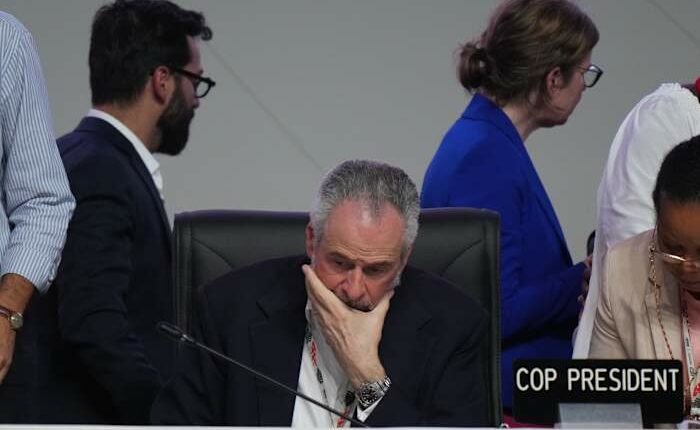Share this @internewscast.com

This year’s United Nations climate conference in Brazil held the promise of being a landmark event, brimming with potential for historic achievements. Known as COP30, the conference took place in Belem, a city that sits at the gateway to the Amazon rainforest. This location is especially significant, as the Amazon plays a vital role in regulating the global climate and is home to numerous Indigenous communities who are both vulnerable to climate change and integral to its solutions.
The conference was bolstered by the presence of Brazilian President Luiz Inácio Lula da Silva. Lula, celebrated for his charisma and diplomatic prowess, delivered passionate speeches that inspired more than 80 nations to rally behind a call for a comprehensive plan to drastically cut the use of fossil fuels such as gas, oil, and coal—key contributors to climate change.
Despite the promising start and high hopes, the final outcomes of the conference were underwhelming. Announced on Saturday, the decisions reached included some positive steps, like increased financial support for developing countries to adapt to climate impacts. However, these measures were largely seen as diluted when compared to previous conferences over the past decade, and they fell short of the ambitious goals set by many participants.
Crucially, the final agreement failed to explicitly mention “fossil fuels,” nor did it establish a timeline for reducing their use. This omission left many delegates disappointed and cast doubt on the effectiveness of the conference as a platform for tackling the urgent issue of global warming.
Ultimately, rather than being celebrated as a turning point, COP30 may instead deepen skepticism about the current international climate negotiation process. Critics argue that this process is increasingly inadequate in addressing the escalating crisis of climate change, which continues to manifest in the form of more frequent and severe weather events such as floods, storms, and heatwaves.
The aftermath of the conference saw widespread criticism from environmentalists and some world leaders, underscoring the growing frustration with the pace of global climate action.
“A climate decision that cannot even say ‘fossil fuels’ is not neutrality, it is complicity,” said Panama negotiator Juan Carlos Monterrey Gomez. “Science has been deleted from COP30 because it offends the polluters.”
Even those who saw some positives were quick to say they were looking toward the future.
“Climate action is across many areas, so on the whole it is a mixed bag. They could have done much, much more,” said Lidy Nacpil, coordinator of the Asian Peoples’ Movement on Debt and Development.
“All eyes are already turning to COP31,” added Nacpil, referring to next year’s conference, which will be held in Turkey.
High expectations for COP30
Saturday’s final resolution was the culmination of three years of talk, from measured optimism to hoopla, about a Conference of the Parties, as the summit is known, that could restore confidence in the ability of multilateral negotiations to tackle climate change. It was even called a “COP of truth.”
From the time Lula was reelected in October 2022, he began pitching his vision of hosting a climate summit for the first time in the Amazon. By 2023, the U.N. had confirmed Brazil’s bid to host it in Belem. The choice of Belem, a coastal city in northeast Brazil, raised many questions, both in Brazil and in many countries, because Belem doesn’t have the infrastructure of other Brazilian cities such as Rio de Janeiro or Sao Paulo.
For Lula, that was the point: This was a chance for the world to get a taste of the Amazon, truly understand what was at stake, and a chance for thousands of Indigenous peoples, who live across the vast territory shared by many South American nations, to participate.
By the time the conference began Nov. 6 with two days of world leaders’ speeches, Lula was able to change the subject from Belem, in large part by laying out a vision of what the conference could be.
“Earth can no longer sustain the development model based on the intensive use of fossil fuels that has prevailed over the past 200 years,” Lula said Nov. 7, adding: “The fossil fuel era is drawing to a close.”
Words like those, coming from the leader who has both curbed deforestation in the Amazon and unabashedly supported oil exploration in it, raised hopes among many delegates, scientists and activists. Here was Lula, the ultimate pragmatist from a major oil-producing country, which gets most of its energy for domestic uses from renewables like hydropower, pushing a major change.
Previous naming of fossil fuels
In late 2023, during COP28 in Dubai, the final resolution declared the world needed to “transition away” from fossil fuels. The past two years, though, nothing had been done to advance that. Indeed, instead of phasing away, greenhouse gas emissions worldwide continue to rise.
Now at COP30, there was talk of a “road map” to fundamentally changing world energy systems.
A few days before the talks concluded, there were signs that even Lula, arguably Brazil’s most dominating political figure of the past 25 years, was tempering his expectations. In a speech Wednesday night, he made the case that climate change was an urgent threat that all people needed to pay attention to. But he was also careful to say that nations should be able to transition to renewable energies at their own pace, in line with their own capacities, and there was no intention to “impose anything on anybody.”
Negotiators would lose much of Thursday, as a fire at the venue forced evacuations.
An outcome that many nations blasted
By Friday, the European Union, along with several Latin American and Pacific Island nations and others, were flatly rejecting the first draft of a resolution that didn’t identify fossil fuels as the cause of climate change or have any timeline to move away from them.
“After 10 years, this process is still failing,” Maina Vakafua Talia, minister of environment for the small Pacific island nation of Tuvalu, said in a speech Friday, talking about the decade since the 2015 Paris Agreement, which set international goals to limit temperature rise.
After an all-nighter from Friday into Saturday, the revised resolution, which U.N. officials called the “final,” did not include a mention of fossil fuels. Environmental activists decried the influence of major oil producing countries like Saudi Arabia, which historically have fought against proposals that put a timeline on reducing oil.
When delegates met Saturday afternoon for the final plenary, COP30 President André Corrêa do Lago gaveled in the text while also promising to continue the discussion of fossil fuels and work with Colombia on a road map that could be shared with other countries. Technically, Brazil holds the presidency of the climate talks until the summit in Turkey next year.
That was little consolation for several dozen nations that complained, including some, such as Colombia, that flatly rejected the outcome.
“Thank you for your statement,” do Lago would say after each one. “It will be noted in the report.”
___
Associated Press reporters Seth Borenstein, Melina Walling and Anton Delgado contributed to this report.
___
Peter Prengaman, AP’s global climate and environment news director, was previously news director in Brazil.
___
The Associated Press’ climate and environmental coverage receives financial support from multiple private foundations. AP is solely responsible for all content. Find AP’s standards for working with philanthropies, a list of supporters and funded coverage areas at AP.org.
Copyright 2025 The Associated Press. All rights reserved. This material may not be published, broadcast, rewritten or redistributed without permission.











